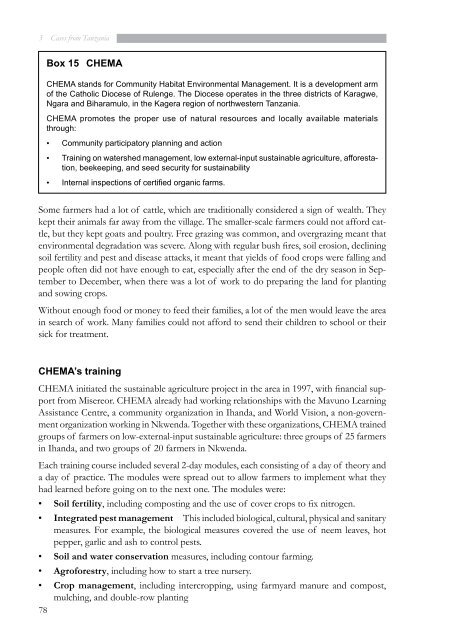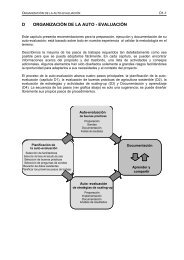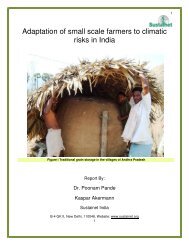cases from tanzania - Sustainet
cases from tanzania - Sustainet
cases from tanzania - Sustainet
You also want an ePaper? Increase the reach of your titles
YUMPU automatically turns print PDFs into web optimized ePapers that Google loves.
3 Cases <strong>from</strong> Tanzania<br />
Box 15 cheMA<br />
CHEMA stands for Community Habitat Environmental Management. It is a development arm<br />
of the Catholic Diocese of Rulenge. The Diocese operates in the three districts of Karagwe,<br />
Ngara and Biharamulo, in the Kagera region of northwestern Tanzania.<br />
CHEMA promotes the proper use of natural resources and locally available materials<br />
through:<br />
• Community participatory planning and action<br />
• Training on watershed management, low external-input sustainable agriculture, afforestation,<br />
beekeeping, and seed security for sustainability<br />
• Internal inspections of certified organic farms.<br />
Some farmers had a lot of cattle, which are traditionally considered a sign of wealth. They<br />
kept their animals far away <strong>from</strong> the village. The smaller-scale farmers could not afford cattle,<br />
but they kept goats and poultry. Free grazing was common, and overgrazing meant that<br />
environmental degradation was severe. Along with regular bush fires, soil erosion, declining<br />
soil fertility and pest and disease attacks, it meant that yields of food crops were falling and<br />
people often did not have enough to eat, especially after the end of the dry season in September<br />
to December, when there was a lot of work to do preparing the land for planting<br />
and sowing crops.<br />
Without enough food or money to feed their families, a lot of the men would leave the area<br />
in search of work. Many families could not afford to send their children to school or their<br />
sick for treatment.<br />
cheMA’s training<br />
CHEMA initiated the sustainable agriculture project in the area in 1997, with financial support<br />
<strong>from</strong> Misereor. CHEMA already had working relationships with the Mavuno Learning<br />
Assistance Centre, a community organization in Ihanda, and World Vision, a non-government<br />
organization working in Nkwenda. Together with these organizations, CHEMA trained<br />
groups of farmers on low-external-input sustainable agriculture: three groups of 25 farmers<br />
in Ihanda, and two groups of 20 farmers in Nkwenda.<br />
Each training course included several 2-day modules, each consisting of a day of theory and<br />
a day of practice. The modules were spread out to allow farmers to implement what they<br />
had learned before going on to the next one. The modules were:<br />
• Soil fertility, including composting and the use of cover crops to fix nitrogen.<br />
• Integrated pest management This included biological, cultural, physical and sanitary<br />
measures. For example, the biological measures covered the use of neem leaves, hot<br />
pepper, garlic and ash to control pests.<br />
• Soil and water conservation measures, including contour farming.<br />
• Agroforestry, including how to start a tree nursery.<br />
• Crop management, including intercropping, using farmyard manure and compost,<br />
mulching, and double-row planting<br />
78




